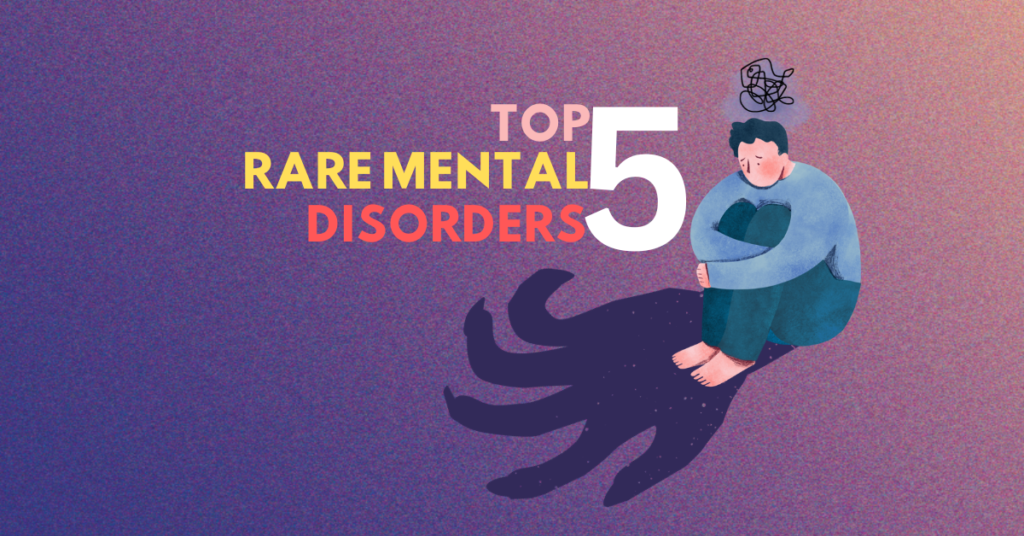
In the vast landscape of mental health, certain conditions stand out not only for their profound impact on individuals but also for their rarity and uniqueness. Beyond the more commonly recognized mental health disorders, a realm of uncommon conditions exists, challenging our understanding of the complexities of the human mind. This exploration delves into the top five rare mental health disorders, shedding light on conditions that, due to their infrequency, often remain shrouded in mystery.
- Alice in the wonderland syndrome
- Depersonalization / Derealization Disorder
- Capgras Syndrome
- Cotard’s delusion
- Factitious disorder
As we embark on this journey, it is essential to recognize that rarity does not diminish the significance of these disorders. In fact, the scarcity of information surrounding them underscores the need for increased awareness, research, and empathy. From syndromes that alter one’s perception of reality to disorders manifesting in peculiar behaviors, each of these conditions represents a unique facet of the intricate tapestry of mental health.
- Alice in the wonderland syndrome
Alice in Wonderland syndrome (AIWS), also known as Todd’s syndrome, is a rare perceptual disorder characterized by distortions in an individual’s sense of space and body image. Named after Lewis Carroll’s iconic character Alice, who experienced surreal and distorted perceptions in “Alice’s Adventures in Wonderland,” this syndrome often causes individuals to perceive their own body parts or surrounding objects as larger or smaller than their actual size. Distorted distances and a warped sense of time are common, contributing to a surreal and disorienting experience.
The exact cause of Alice in Wonderland syndrome remains elusive, but it is often linked to conditions such as migraines, viral infections, and epilepsy. While the syndrome is more frequently reported in children and adolescents, it tends to improve with age. Although the perceptual distortions associated with AIWS are typically temporary and do not necessarily indicate a severe mental health condition, the impact on daily life can vary. - Depersonalization/Derealization Disorder
Depersonalization/Derealization Disorder (DP/DRD) is akin to watching your life unfold through a foggy window. In straightforward terms, it’s a mental health condition that creates a sense of disconnection from oneself and the surrounding world. During episodes of depersonalization, individuals might experience a sense of detachment, feeling like mere onlookers in their own lives rather than active participants. Simultaneously, derealization adds a surreal touch to the external environment, transforming familiar scenes into dreamlike settings with an otherworldly vibe.
While the exact reasons behind this condition remain somewhat unclear, it often emerges in the aftermath of stressful events, trauma, or periods of heightened anxiety. Those grappling with DP/DRD may experience a sensation of losing touch with reality. The silver lining lies in therapeutic approaches, where individuals can discuss their experiences and learn techniques to anchor themselves in the present. By fostering understanding and open conversations about DP/DRD, we can dismantle stigma and provide support to those navigating the intricate terrain of altered perception and self-awareness. - Capgras Syndrome
Capgras Syndrome is a rare and intriguing psychological phenomenon where a person believes that someone close to them, usually a family member or friend, has been replaced by an imposter. In simpler terms, imagine feeling like the people you love aren’t really who they appear to be. It’s as if your mind plays a trick on you, making you doubt the identity of those you know well.
This syndrome often arises after a brain injury or as a result of certain psychiatric conditions. The affected person may intellectually recognize the person in front of them, but emotionally, they believe that the familiar face is an imposter. This discrepancy between intellectual recognition and emotional response can lead to a sense of confusion and distress. Understanding and addressing Capgras Syndrome involves a combination of psychological support and, in some cases, medical intervention. By shedding light on this unique phenomenon, we aim to foster empathy and reduce the stigma associated with mental health challenges. - Cotard’s delusion
Cotard’s Delusion, also known as “Walking Corpse Syndrome,” is a rare and perplexing mental health condition where an individual sincerely believes that they are dead, don’t exist, or have lost essential parts of their body, like organs or blood. Imagine feeling convinced that you’re no longer alive, despite evidence to the contrary. It’s like experiencing a profound disconnection from reality, where the sense of self and one’s own existence becomes distorted.
This condition often arises in the context of severe depression or following a traumatic event. People with Cotard’s Delusion may express sentiments like being devoid of life, lacking a soul, or even physically decomposing. It’s a challenging condition that requires a combination of psychological support, medication, and therapy for effective management. - Factitious disorder
Factitious Disorder, often referred to as Munchausen Syndrome, is a complex mental health condition where individuals intentionally pretend to have physical or psychological symptoms. In simpler terms, it’s like someone acting as if they are sick or injured, even though there’s no genuine medical reason for it. People with Factitious Disorder might go to great lengths to fabricate symptoms, often seeking unnecessary medical attention, undergoing numerous tests, or even subjecting themselves to treatments they don’t need.
Unlike other disorders where symptoms are genuine, in Factitious Disorder, the motivation is to assume the “sick role” and receive care, sympathy, or a sense of importance from being perceived as unwell. This can be perplexing because the person creating the deception is aware that they are not actually sick. Understanding and addressing Factitious Disorder involve careful psychological evaluation and, in some cases, therapy. By shedding light on this condition, we aim to raise awareness and encourage empathy for individuals facing mental health challenges that manifest in such unique ways.
Conclusion
In delving into the exploration of the top five rare mental health disorders, we’ve uncovered the intricate and often overlooked aspects of the human mind. The rarity of conditions like Alice in Wonderland syndrome, Cotard’s Delusion, Capgras Syndrome, Depersonalization/Derealization Disorder, and Factitious Disorder underscores the imperative for increased awareness, research, and empathy. Our mental health center, staffed by a dedicated team of professionals, stands ready to provide comprehensive support, fostering awareness, reducing stigma, and offering empathetic care. Through tailored therapeutic approaches and psychological support, we aspire to be a guiding light for those facing rare mental health conditions. Our aim is to contribute to a more compassionate and informed society, where individuals confronting rare mental health challenges feel seen, heard, and supported on their journey toward well-being.




